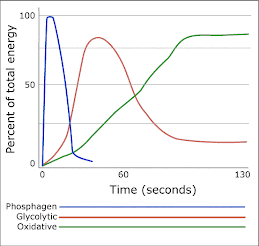This Bolg is a summative assessment and is due by Mon. 9/15/08
Over the next couple of weeks we will be working on our "Muscle Memory" for various movements. Define muscle memory and explain how it can benefit you in your training.
This blog will count as a summative assessment and I will not post answers until next Monday, so don't keep posting just because you do not see your post up there. If you submitted it I have it.
Great SEO Advice for CrossFit Gyms
4 years ago

11 comments:
Muscle memory refers to the familiarization of muscles to a certain movement made by the body. The muscles become more accustomed to making that certain movement and because of that, proper form becomes more of a habit than something you must consciously think about every repetition. With time, becoming accustomed to a certain movement allows the body to perform that action much more easily. This is a benefit when working on form, but when the body has adapted to that exercise, it does not get as much out of it. This is why we cycle exercises and sometimes switch one for another in a workout regimen. Also, muscle memory can interfere for those who learn an exercise originally with poor technique. Because they have become in the habit of doing it the wrong way, it's very hard to break that habit and correct form in order to limit the risk of injury. Because of this, starting light on exercises and perfecting form is much more important than building a lot of muscle early on. This is why we are focusing on it now: To make it easier on ourselves later on in lifting while doing these exercises.
-Jack Corbett
If you are doing a lift or some sort of exercise, your muscles will learn how to do that specific thing the first time you are doing it. Once you repeat the lift for numerous repetitions, your muscles will know what they are supposed to do without you thinking too hard about it. This can benefit you in your training if you are doing everything with correct form, because your muscles will continue to use correct form and you will become stronger. Simply by doing things over and over again, your brain will work with your muscles to remember exactly how to do everything you have done in the past.
- Max Simon
Muscle memory is when you do something enough times that it becomes engrained in your bodys nervous system. This can be beneficial because if you do an excersise with proper from a number of times, it will become part of muscle memory and you'll never have to relearn it again.
Andrew Weinstein
Muscle Memory is when your muscles become familiar with certain body movements and in active sports. Over time, your body doesn't have to think about what muscle you need to use for a certain movement. This is very beneficial during one's training because when your muscle memory builds, it is easier to do the workout your doing. Therefore, there is less of a chance of injury during a work out, assuming you are using perfect form. Perfect form is also key to muscle memory.
-Steven Rubin
Muscle memory is the movements that you body has memorized and can do easily. As a muscle repeats a movement many times, the brain can memorize the movement.
this is important as we learn correct form because we must make our muscles memorize how to do things right. Muscle memory can work against as it remmebers out bad habits as well as good ones. If we learn good form, out muscles will memorize how to do those movements and therefore we will get good form, increasing strenght and minimizing risk of injury.
mitchell levy
Muscle memory is how your muscles train to do things by repeating the same motion over and over
Zac Mason
It is a movement that is done over and over again. Muscle memory helps memorize motor skills. Muscle memory will me train, If i have trained to do the same movement in correct form i will always be using correct form.
-Aaron Fensterheim
Muscle memory is defined as the physiological adaptation of the body to repetition of a specific physical activity, resulting in increased neuromuscular control when performing that activity again. This is helpful in weight lifting because once you do a certain lift numerous times. It should become fluid and your muscles should be able to do that lift well because your muscles memorize that motion.
Muscle memory is the act of familiarizing the brain and muscles with a particular movement. For example, if we continue to practice perfect squat form over and over again, then it will become habbit and ingrained into our "muscle memory". This helps a great deal in our training because once the movement is learned, we do not need to worry about it and can focus on increasing the difficulty or weight.
- Matt Scherer
Muscle memory can apply to almost anything, in this case, lifting. Muscle memory is developed when an action is repeated many times. The brain learns to perform that specific muscle activity without you having to concentrate on doing it. It is beneficial because muscle memory can help us perfect our lifting form so that we don't have to repeatedly concentrate on making sure we are using the correct form or fixing our form.
-conrad austen
Muscle memory is when your muscles become familiar with each other. Since muscle memory is an unconcious process the more you practice at one thing the better you will get as you go on.
Andrew Yi
Post a Comment